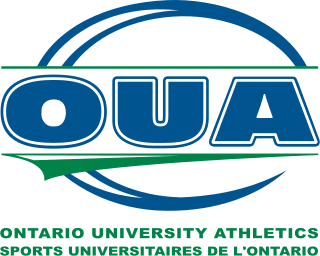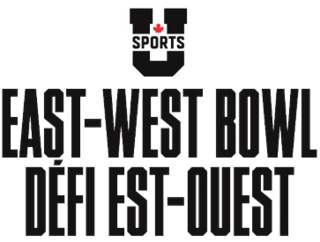Related Research Articles

Ontario University Athletics is a regional membership association for Canadian universities which assists in co-ordinating competition between their university level athletic programs and providing contact information, schedules, results, and releases about those programs and events to the public and the media. This is similar to what would be called a college athletic conference in the United States. OUA, which covers Ontario, is one of four such bodies that are members of the country's governing body for university athletics, U Sports. The other three regional associations coordinating university-level sports in Canada are Atlantic University Sport (AUS), the Canada West Universities Athletic Association (CW), and Réseau du sport étudiant du Québec (RSEQ).
The CFL draft is an annual sports draft in which the teams of the Canadian Football League (CFL) select eligible Canadian/non-import players, typically from the ranks of U Sports football or NCAA college football. Member clubs make selections based on the reverse order of the previous year's standings, with the team with the worst record being awarded the first selection, the Grey Cup runner-up getting the second-to-last selection and the Grey Cup champion selecting last. The draft is held once every year, approximately six weeks prior to the start of the upcoming season.
The 2005 CFL Draft took place on Thursday, April 28, 2005 at 11:30 AM ET. 53 players were chosen from among eligible players from Canadian Universities across the country, as well as Canadian players playing in the NCAA. Of the 53 draft selections, 33 players were drafted from Canadian Interuniversity Sport institutions.

U Sports football is the highest level of amateur play of Canadian football and operates under the auspices of U Sports, Canada's governing body for university sports. Twenty-seven teams from Canadian universities are divided into four athletic conferences, drawing from the four regional associations of U Sports: Canada West Universities Athletic Association, Ontario University Athletics, Réseau du sport étudiant du Québec, and Atlantic University Sport. At the end of every season, the champions of each conference advance to semifinal bowl games; the winners of these meet in the Vanier Cup national championship.
The 1970 CFL draft took place on Wednesday, February 11, 1970. Seventy-six players were selected from among 243 eligible players from Canadian universities and colleges. Canadian-born players who played at American colleges, such as Jim Corrigall of Kent State and Zenon Andrusyshyn of UCLA, were subject to the CFL's territorial rights rules and were ineligible for the College Draft.
The 1987 CFL Draft composed of eight rounds where 72 Canadian football players were chosen from eligible Canadian universities and Canadian players playing in the NCAA.
The 1973 CFL Draft composed of nine rounds where 93 Canadian football players were chosen from eligible Canadian universities and, for the first time, Canadian players playing in the NCAA. Prior to 1973, teams were given exclusive signing privileges to Canadian players who attended U.S. schools based on the territory he was domiciled. After the draft was expanded to include NCAA schools, teams were also permitted to exempt from the draft and select players from their area, regardless of where they attended school.
The 1975 CFL Draft composed of eight rounds where 81 Canadian football players were chosen from eligible Canadian universities and Canadian players playing in the NCAA. A total of 16 players were selected as territorial exemptions, with the Montreal Alouettes being the only team to make no picks during this stage of the draft. Through a trade with the Calgary Stampeders, the Winnipeg Blue Bombers selected first overall in the draft. They would not choose first overall again until the 2011 CFL Draft.
The 1978 CFL Draft composed of eight rounds where 90 Canadian football players were chosen from eligible Canadian universities and Canadian players playing in the NCAA. A total of 18 players were selected as territorial exemptions, with the Toronto Argonauts being the only team to make no picks during this stage of the draft.
The 1982 CFL Draft composed of six rounds where 72 Canadian football players were chosen from eligible Canadian universities and Canadian players playing in the NCAA. A total of 18 players were selected as territorial exemptions, with every team making at least one selection during this stage of the draft.
The 1986 CFL Draft composed of eight rounds where 72 Canadian football players were chosen from eligible Canadian universities and Canadian players playing in the NCAA.
The 1988 CFL Draft composed of eight rounds where 64 Canadian football players were chosen from eligible Canadian universities and Canadian players playing in the NCAA. This was the first draft not to feature a Montreal franchise, as the Alouettes had folded just before the start of the 1987 regular season. This was also the first national draft to feature only eight teams.
The 1990 CFL Draft composed of eight rounds where 64 Canadian football players were chosen from eligible Canadian universities and Canadian players playing in the NCAA.

The CFL Combine is a three-day program in which athletes from Canadian universities and Canadians in the NCAA are scouted by general managers, coaches and scouts of the Canadian Football League (CFL). The goal of the camp is for the nine CFL franchises to have a better idea of whom they would like to draft in the CFL draft which usually takes place roughly six weeks after the camp. The first combined Evaluation Camp took place in 2000 in Toronto and continued every year in Toronto until 2016 when it was announced that Regina would host the combine in 2017. It was also suggested that the league would begin rotating the Combine hosts every year. Winnipeg hosted in 2018 and the event returned to Toronto in 2019 and 2020 with the hiatus of the CFL Week event. In 2021, the event was purely remote due to the COVID-19 pandemic in Canada but was brought back to Toronto in 2022. The event's hosts began to rotate again with Edmonton, Winnipeg, and Regina hosting in the three subsequent years.
The 1952 IRFU college draft was an unofficial sports draft held by the Interprovincial Rugby Football Union, a predecessor of the East Division of the Canadian Football League, in the spring of 1952. The concept was first developed at a meeting between Eastern officials on April 6, 1952. In the meeting, the delegates agreed, in principle, that eligible college athletes would be selected by member clubs with the last place team selecting first in each round. While the draft was unofficial, players selected in this draft were indeed added to the rosters of the clubs that had drafted them.
The 1953 IRFU college draft was the first official sports draft held by the Interprovincial Rugby Football Union, a predecessor of the East Division of the Canadian Football League, in the spring of 1953. 40 players were chosen from among eligible players from five eastern universities, McGill University, Queen's University, University of Toronto, University of Western Ontario, and McMaster University. The Montreal Alouettes had the first selection, Doug McNichol, who became the first player to be drafted to a Canadian professional football team.
The 1955 IRFU college draft was the third and final official sports draft held by the Interprovincial Rugby Football Union, a predecessor of the East Division of the Canadian Football League, in the spring of 1955. 41 players were chosen from among eligible players from five eastern universities, McGill University, Queen's University, University of Toronto, University of Western Ontario, and McMaster University. The Ottawa Rough Riders had the first selection, Gino Fracas, in the last draft to feature eastern teams exclusively.
The 1954 IRFU college draft was the second official sports draft held by the Interprovincial Rugby Football Union, a predecessor of the East Division of the Canadian Football League, in the spring of 1954. 32 players were chosen from among eligible players from five eastern universities, McGill University, Queen's University, University of Toronto, University of Western Ontario, and McMaster University. The Toronto Argonauts had the first selection, Bill McFarlane, in a draft where only six players would ever play in a professional football game.

The U Sports East–West Bowl is an annual preseason Canadian university football all-star game which showcases the top U Sports football prospects in the country who will be eligible for the following year's CFL Draft. The East–West Bowl is organized by the Canadian University Football Coaches Association (CUFCA) with the support of the Canadian Football League (CFL). It brings together over 90 of the top U Sports football players for a week of practices and evaluation, culminating with the annual all-star game. A national committee of U Sports head coaches selects the participants from a pool of players nominated by their respective universities. Players who are generally in their third year of eligibility are the prime candidates for nomination. Every U Sports football program is represented by a minimum of three and a maximum of four players who will be eligible for the CFL draft the following year. Each school submits a list of six players they nominate. A committee of U Sports coaches and CFL representatives review the nominations and determine who gets invited.
References
- ↑ "2014 CFL Draft Guide". Archived from the original on 2014-11-28. Retrieved 2014-11-13.
- 1 2 3 Draft History Archived 2013-04-23 at the Wayback Machine